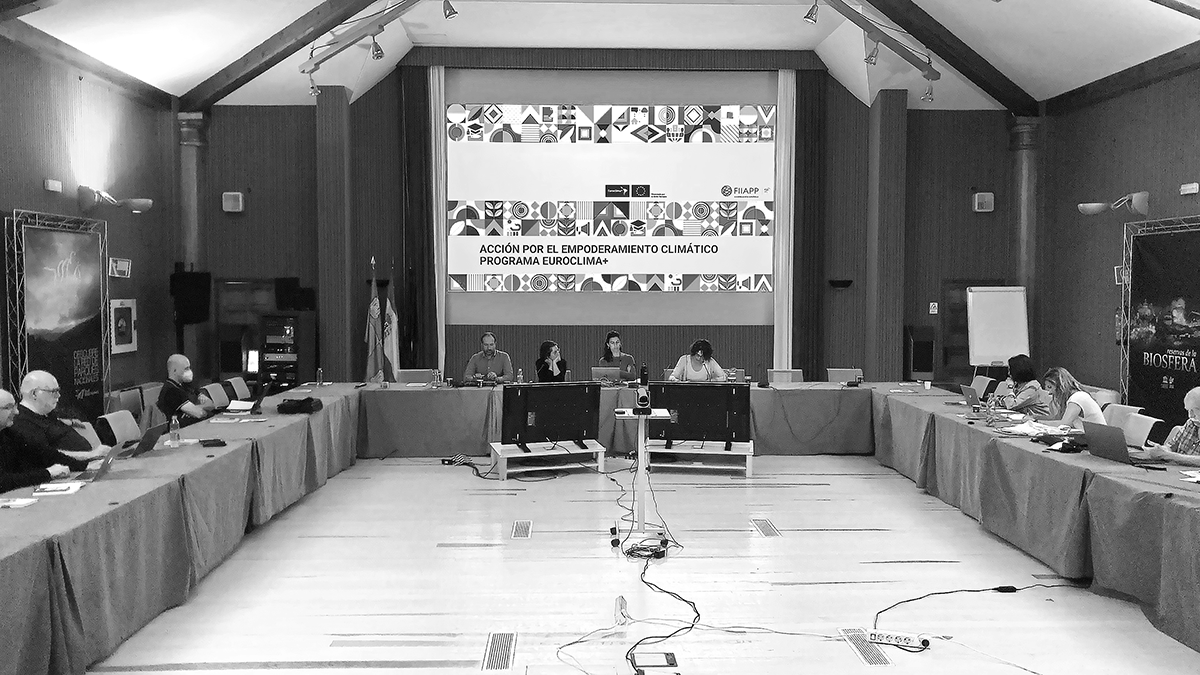The EUROCLIMA+ programme participates in the historic seminar, promoted by the Spanish Climate Change Office, to present the work developed in Action for Climate Empowerment in the Latin American region.
Madrid, 2 June. - On 30 and 31 May and 1 June, the 19th Seminar on Responses from Education and Communication to Climate Change was held, an annual meeting of the working group set up at the initiative of the Climate Change Office of the Spanish Ministry for Ecological Transition and the Demographic Challenge, was held at the National Centre for Environmental Education CENEAM (Madrid, Spain) .
The group meets annually with the objectives of carrying out a diagnosis of the development in Spain of Article 6 of the United Nations Framework Convention on Climate Change on Action for Climate Empowerment; analysing the effectiveness of the activities foreseen in the ACE of the Climate Change Convention and examining the links between these activities, the implementation of policies and measures aimed at mitigating change; and encouraging the exchange of ideas and experiences and collaboration between people working on the promotion of renewable energies, energy saving and sustainable mobility.
Technical staff from different Spanish public administrations working on environmental communication and education for climate change, members of academia and civil society organisations will participate in the seminar.
This year's meeting was attended by Elena Oliveros and Fátima Andrade, technicians from the International and Ibero-America Foundation for Administration and Public Policy, who are coordinating the actions developed under the Action for Climate Empowerment programme's line of work, and Jorge Sánchez Cruzado, member of the Altekio cooperative, the entity in charge of facilitating the Community for Practical Learning on ACE in EUROCLIMA+.
Elena Oliveros and Fátima Andrade presented the main actions that are being supported under the framework of the programme in the region, with the aim of advancing the national ACE agendas. In this regard, it is worth highlighting the support to several countries in the development of their respective National Strategies for ACE (ENACE), with processes underway in Argentina, Chile, Colombia, Costa Rica, Panama and Uruguay. The ENACES are the strategic frameworks that outline the roadmap to be followed in the design and development of ACE plans and actions, as well as in the incorporation of its elements - awareness raising, education, training, access to information, international cooperation and participation - in climate policies aimed at fulfilling national commitments (NDCs) under the Paris Agreement.
For his part, Jorge Sánchez (Altekio) presented the development of the Community for Practical Learning (CAP) of ACE, a working space created by the EUROCLIMA+ Programme in alliance with OREALC/UNESCO Santiago, with the aim of accompanying the development of present actions and future scenarios on ACE in the region, responding to the needs expressed by the Latin American countries. This CAP aims to be a space for collective intelligence to promote actions for climate empowerment, sustainable development and Education for Development in Latin American countries.
During his intervention, Jorge Sanchez highlighted his role in the identification of needs, as well as in the exchange and socialisation of lessons learned among practitioners, and the opportunity it provides for strengthening the ACE agenda at regional level. The CAP ACE is made up of representatives from the ministries of environment and education of 15 Latin American countries, and currently has more than 60 members who participate in monthly exchange sessions, webinars and other joint work spaces.
About EUROCLIMA+
EUROCLIMA+ is a programme funded by the European Union to promote environmentally sustainable and climate-resilient development in 18 Latin American countries, in particular for the benefit of the most vulnerable populations. The Programme is implemented under the synergistic work of seven agencies: the Spanish Agency for International Development Cooperation (AECID), the French Development Agency (AFD), the Economic Commission for Latin America and the Caribbean (ECLAC), the German Society for International Cooperation (GIZ) GmbH, Expertise France (EF), the International and Ibero-America Foundation for Administration and Public Policy (FIIAPP), and UN Environment.
